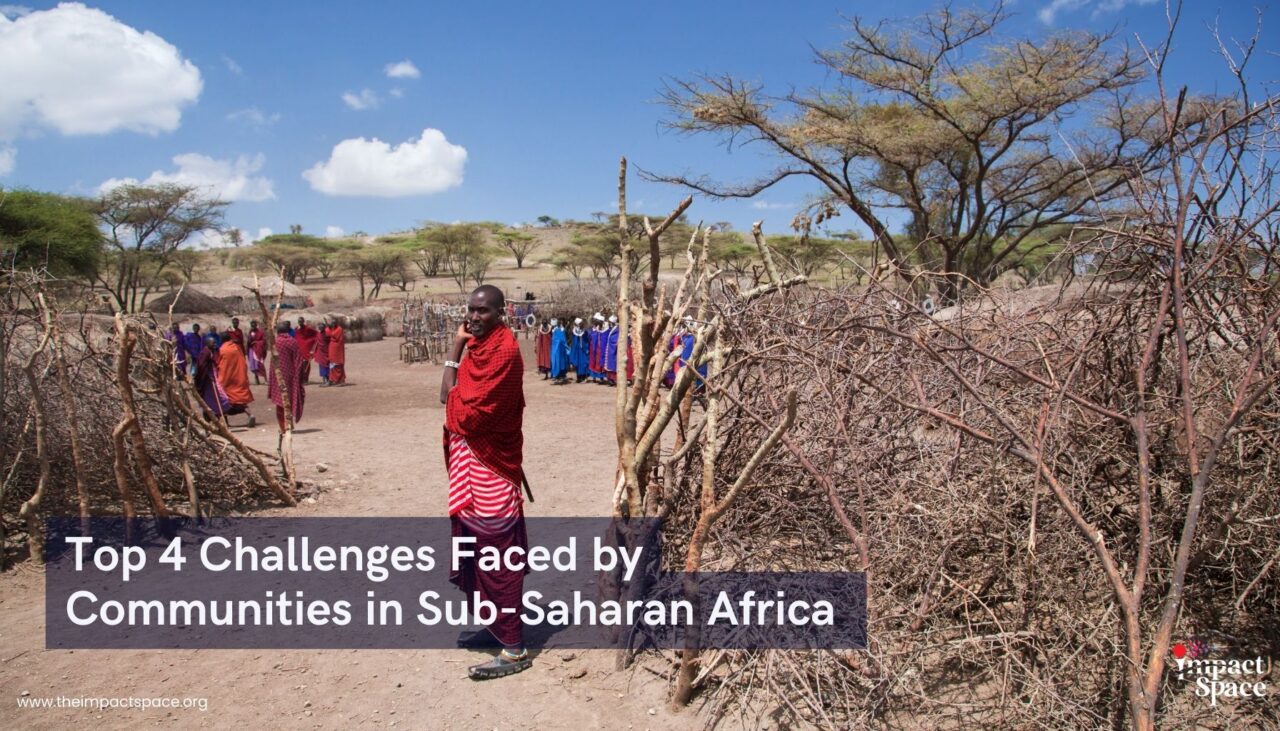Sub-Saharan Africa is a beautiful and diverse place, but many communities there struggle. People don’t have enough clean water to drink, food to eat, or healthcare when they’re sick. Children often can’t go to school. This article will look at these 4 main problems and how people are trying to solve them.
1. Limited Access to Clean Water: Many communities lack safe drinking water, which causes health and sanitation issues. The United Nations estimates that by 2025, 1.8 billion people would live in areas with absolute water scarcity. Climate warming might cause nearly half of the world’s population to endure severe water scarcity by 2030. This problem has the potential to displace up to 700 million people worldwide, with Africa bearing the lion’s share of the burden. Up to 25 African countries are predicted to experience increased water scarcity by 2025, notably in Sub-Saharan Africa, where only 22-34% of the population has access to quality water.
2. Food Insecurity: In Africa, about 282 million people, or around 20% of the population, are malnourished, with a 57 million increase since the beginning of the COVID-19 pandemic. Over a billion people cannot afford a good meal, and about 30% of children are stunted due to malnutrition. Droughts and bad infrastructure are among the agricultural difficulties that contribute to food shortages and malnutrition. Despite global ambitions, Africa is not on track to meet food security and nutrition targets by 2030, or the Malabo targets by 2025.
3. Limited Healthcare Services: Access to effective healthcare is limited in many areas, resulting in preventable illnesses and high mortality rates. Life expectancy in Sub-Saharan Africa has increased somewhat, from 61.2 years in 2016 to 63.9 years in 2017. However, health disparities exist within and between countries, with large differences in life expectancy. Poverty, hunger, a lack of access to clean water and healthcare, and the prevalence of HIV/AIDS are all contributing factors to high disease rates. Human behavior, such as migration and consumption patterns, also influences disease propagation. Furthermore, tight interactions between humans, animals, and the environment can result in conflict and the spread of zoonotic illnesses. Disease targets, such as lowering malaria and tuberculosis mortality by 2030 and 2035, respectively, may not be realized.
4. Educational Barriers: A lack of schools, teachers, and resources stifles children’s education and perpetuates cycles of poverty. Sub-Saharan Africa has the highest rates of educational exclusion among developing countries. More than one-fifth of primary-age children are not in school, and approximately 60% of young people aged 15 to 17 do not attend. School fees are a significant barrier that causes financial stress for families. Digital financial services provide a solution for managing school tuition payments and keeping children in school. Concern over school fees is prevalent, with more than half of adults in Sub-Saharan Africa extremely concerned about paying them. In numerous countries, like Kenya and Nigeria, school fees are a major source of financial concern for many.
To address the gaps and challenges in clean water access, food security, healthcare, and education, here are some general measures that can be taken:
1. Policy Reform and Investment: Governments should prioritize investments in infrastructure for clean water, agriculture, healthcare, and education. Adequate finance and resource allocation are required to carry out these policies successfully
2. Community Engagement and Empowerment: Engaging with local communities and allowing them to actively engage in decision-making processes can lead to more long-term solutions. Communities should be included in project development, implementation, and monitoring for water, food, health, and education.
3. Promotion of Sustainable Practices: Promoting sustainable methods in agriculture, water management, and healthcare can help to reduce environmental deterioration and ensure long-term survival. This includes supporting organic farming, water conservation techniques, and prevention-focused healthcare procedures.
4. Capacity Building and Training: Investing in training programs for farmers, healthcare professionals, teachers, and community leaders can help them enhance their skills and ability to deal with issues. This includes training in sustainable farming practices, healthcare delivery, and educational methods.
5. Technology and Innovation: Harnessing technology and innovation can help address gaps in access and service delivery. For example, using mobile technology for healthcare monitoring, implementing drip irrigation systems for agriculture, and utilizing e-learning platforms for education can improve efficiency and effectiveness.
6. Collaboration and Partnership: Collaboration between governments, non-governmental organizations, international agencies, and local communities is crucial for addressing complex challenges comprehensively. Partnerships can leverage resources, expertise, and networks to implement scalable and sustainable solutions. Impact space is one such organization contributing its quota in addressing some of these challenges faced in underserved communities through its varied impact initiative.
7. Empowerment of Vulnerable Groups: Empowering marginalized and vulnerable groups, including women, children, and people with disabilities, is essential for inclusive development. This may involve providing access to education, healthcare, and economic opportunities, as well as addressing systemic inequalities and discrimination.
8. Advocacy and Awareness: Raising awareness about the importance of clean water, food security, healthcare, and education is crucial for mobilizing support and driving action. Advocacy efforts can also hold governments and other stakeholders accountable for their commitments to address these challenges.
By implementing these general measures, communities, governments, and organizations can work together to address the gaps and challenges in clean water access, food security, healthcare, and education, ultimately improving the well-being of people in Sub-Saharan Africa and beyond.
Impact Space is a non-profit organization headquartered in the United State with a heart for service and a passion for change dedicated to tackling global poverty and igniting transformative change across Africa and beyond. We invite you to support our mission by donating to us via Impact Space’s better world fundraising portal. For more enquiries and collaborations please write to us at hello@theimpactspace.org.



